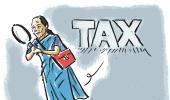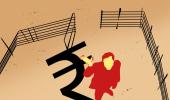Everyone (with some exceptions) whose estimated tax liability is Rs 10,000 or more in a financial year must pay advance tax.

The final deadline for paying the fourth instalment of advance tax for the assessment year 2024-25 is March 15.
Advance tax on estimated income must be paid during the year in which it is earned, rather than as a lump sum at the time of filing your tax return.
"This system, known as the 'pay as you earn' approach, contrasts with the traditional lump sum payment at the fiscal year-end. It provides a structured and manageable way for individuals and businesses to meet their tax obligations," says Ritika Nayyar, partner, Singhania & Co.
At least 15 per cent of advance tax must be paid by June 15 of the financial year, 45 per cent by September 15, 75 per cent by December 15, and 100 per cent by March 15.
Everyone (with some exceptions) whose estimated tax liability is Rs 10,000 or more in a financial year must pay advance tax.
Presumptive scheme
Independent professionals like doctors, lawyers, and architects fall under the presumptive taxation scheme (Section 44ADA).
They are not required to pay advance tax quarterly but by March 15 of the financial year.
Pallav Pradyumn Narang, partner, CNK, says, "If they earn other income, or any income not subject to withholding tax, they should pay advance tax quarterly for those incomes."
Salaried individuals
Salaried individuals are generally exempt from paying advance tax.
But in certain circumstances, they may be liable to pay it.
Employers deduct tax at source (TDS) from an employee's salary. Salaried employees should disclose their other sources of income and the various tax deductions available to them to enable accurate TDS deduction.
When estimating advance tax liability, prepaid taxes like TDS and Tax Collected at Source (TCS) are subtracted from the calculated tax liability.
"If an employee fails to provide details of other income or deductions to their employer, it can result in under-deduction of TDS, leading to advance tax liability," says Naveen Wadhwa, vice president, research and advisory, Taxmann.
Adds Adithya Reddy, international tax lawyer: "Generally, the tax liability of Rs 10,000 or more is calculated after deducting the employer's TDS."
Experts say salaried taxpayers with income from sources like interest, rent, capital gains, etc. should pay advance tax.
Senior citizens exempted
Senior citizens are not required to pay advance tax if they have no income from business or profession.
NRIs must pay
NRIs should evaluate all their income sources -- rent, capital gains, and interest income -- in India to determine their tax liability.
"While TDS would cover part of the tax obligations of salaried NRIs, they could still face advance tax requirements if their total liability exceeds Rs 10,000. They must also consider the tax treaties between India and their country of residence while determining their tax liability," says Nayyar.
Wadhwa informs that non-resident senior citizens are not exempted from the obligation to pay advance tax, even if their income comes solely from sources like investments.

Beware of penalty provisions
A penalty can be levied on non- or under-payment of advance tax under two sections.
Section 234B imposes a 1 per cent per month (or part of a month) interest rate if the total tax paid is less than 90 per cent of the assessed tax by the end of the financial year.
Nayyar says, "Section 234C applies if the advance tax paid by specific due dates (March 15, June 15, and so on) is less than the specified percentage of the assessed tax."
Those who have missed the prescribed deadlines may pay advance tax before March 31 of that year.
Such payment will be considered advance tax. However, it is better to be mindful of due dates to avoid penalties.
Things to keep in mind
Estimate your tax liability and pay advance tax instalments on time to avoid interest and penalties.
Suresh Surana, founder of RSM India says, "After paying advance tax, download the challan generated as you will need the BSR code (identifier for the bank branch where tax was paid) and challan number while filing the tax return."
A refund claim can be made on excess advance tax paid by submitting Form 30.
Feature Presentation: Aslam Hunani/Rediff.com












 © 2025
© 2025